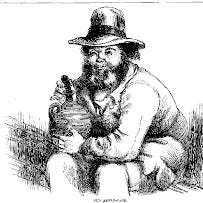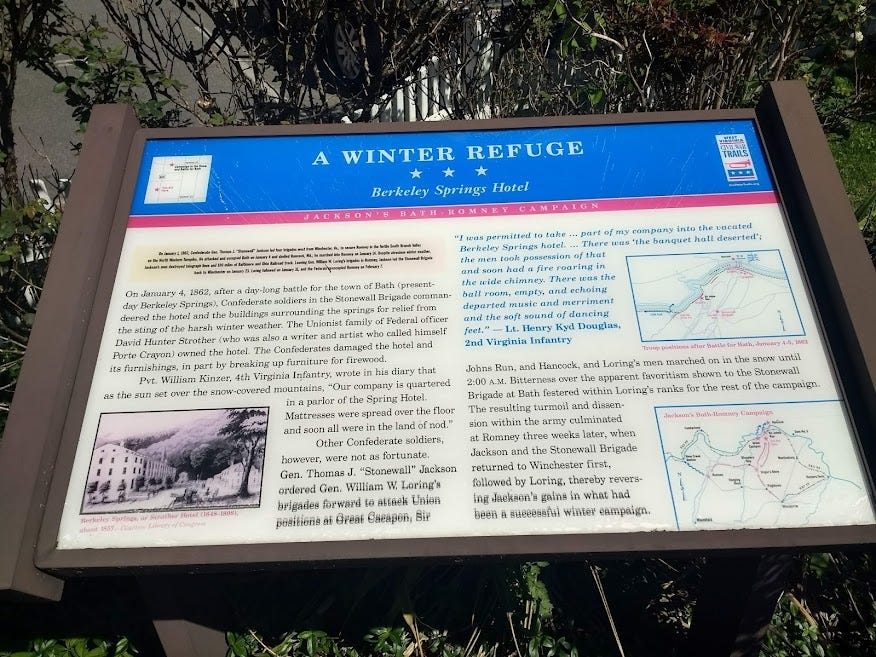You knew this was coming, right?
Not sure I could have made it any more obvious. I mean, I did spell it out last week.
And even if I hadn’t, it seems to me that a name change probably doesn’t surprise anyone. After all, this newsletter has increasingly been focusing on the life and work of David Hunter Strother, the 19th century writer, artist, soldier and diplomat known to his readers by his Porte Crayon pen name. He was famous for writing about the high mountains of what is now West Virginia but also for his travelogues from New England to the American South.
Anyway, the new year seemed like a good time to change the name of this newsletter to better reflect where it’s heading. So say goodbye to the old “News from the Stoop” and hello to “The Porte Crayon Applejack Society.”
Membership is free.
All you have to do is subscribe.
Aside from silly EXCLUSIVE pictures of our cats and Ornery Dog Jasper, there are no tangible benefits to receiving this newsletter in your inbox.
Except maybe for this: While I don’t claim to be an expert on our friend Porte, we’ll learn about him together and build a community around a shared interest in his life and legacy. I’m planning to go where he went, read what he wrote and tell you about it.
Also, every now and again, you might find an applejack cocktail recipe here. This week, members can see how to make the venerable Jack Rose at the bottom of this email.
Why applejack?
Because Porte mentions it in his writings about mountain people. It was once a popular liquor, especially during colonial times. But much like Porte himself, it fell out of fashion.
That’s enough for now about my decision to switch things up and actually give some focus to this newsletter because it’s time for me to fess up.
The Snyder family owes Porte a belated apology.
I’ve decided to make amends now because New Year’s Day marks 160 years since the start of Stonewall Jackson’s Romney Campaign, a miserable affair marked by the worst sort of winter weather. You can take my Civil War grandfather Snyder’s word for it.
In a letter he wrote to his wife, Rachel, John Snyder described a campaign that devolved into a feat of endurance - a battle against the elements more than anything else.
The Romney Campaign started out well enough, which is to say the weather was much like it is today. Earlier this week, I was out on the stoop, sitting in my rocking chair, sipping hot tea and wearing shorts - IN JANUARY. I didn’t even think to spike my tea with a little applejack - a missed opportunity, but it’s not like I needed the extra warmth.
So yeah, the weather was fine at the beginning of 1862, but it wasn’t long before snow, sleet and rain caught up with Jackson’s command.
Grandfather John wrote to his wife about having to sleep the first three nights “without anything to cover us but the snow that fell on us, and nothing to eat except what we had in our haversacks.”
On the fourth night, he wrote of reaching Berkeley Springs, better known at the time as the town of Bath. John told his wife that “we had good quarters in a fine house.”
John Snyder was from Shepherdstown in what is now West Virginia. He and his crew from the area made up Company B of the Confederate 2nd Virginia regiment. They were part of the famous Stonewall Brigade, at least some of whom ended up taking shelter from the harsh winter weather inside the Berkeley Springs Hotel.
The hotel was destroyed by fire in 1898, but if you find yourself in Berkeley Springs, look for the historical marker outside its successor, The Country Inn. It speaks of a different sort of fire kindled in 1862. Company B’s lieutenant, Henry Kyd Douglas, is quoted as saying that some of his men were allowed into the hotel “and soon had a fire roaring in the wide chimney.”
That roaring fire? It was fueled by the hotel’s furniture.
And here’s where the apology comes in.
The Berkeley Springs hotel was owned by Porte and his father, Colonel John Strother. They were well known southern unionists. In fact, David Hunter Strother was serving as a topographer for federal forces in the Shenandoah Valley at the time the Stonewall Brigade trashed his hotel and would soon be commissioned a captain in the Union Army. He would end the war as a Brigadier General.
I take Grandfather John’s reference to “a fine house” at face value, that he likely slept elsewhere. But it seems to me with at least some members of his Company B quartered at the Berkeley Springs Hotel, John could very well have warmed himself by the furniture fire before retiring.
My shoulders sag at the thought.
Apologies, Porte.
And no hard feelings, okay?
That’s it for me this week.
I took today off, but I'll see you on the radio tomorrow.
In the meantime, let me know what you think of the change to “The Porte Crayon Applejack Society.” Bear in mind I worked hard on the new banner!
Oh … and I almost forgot that Jack Rose recipe. You’ll see it below if you get this newsletter in your inbox.
To be honest, you can find it easily enough on the internet. But if you just want to get an email from me - subscribe, let me you know you want it and I’ll be happy to forward it to you.
Happy new year!





Hi, Giles, I must apologize for being quite a bit behind in keeping up with your Porte Crayon pieces. I’m on a ship making my way south to Patagonia now and have time to catch up on reading. They are both informative and entertaining! I’ve thoroughly enjoyed them and look forward to more. I ran across Strother’s story some years ago, wondering why a mountain was named that way. His is, indeed, a fascinating story and I thank you for bringing it more to light. Looking forward to a glass of applejack and some more from you! Best, Skip.
Hi Giles. I didn't know anything about Porte Crayon until recently, after looking up an illustration about "hillbillies." I'm glad you hiked Mount Porte Crayon, it's supposed to be one of West Virginia's most inaccessible peaks.